Crushed Asphalt Driveway – 7-Steps Installation Guide
A crushed asphalt driveway is a cost-effective way to pave your way. It’s environmentally friendly because it uses recycled materials for a smooth finish. It combines durability with sustainability, providing you a robust alternative to traditional concrete or gravel driveways.
Here are 7 steps to install it:
- Clear the area
- Level the surface
- Take care of drainage issues
- Pick the right material
- Spread and compact the asphalt
- Create an even surface
- Inspect and maintain regularly
Learn more about how to get started on installing it.
7 Steps Crushed Asphalt Driveway Installation
To make sure that your crushed asphalt driveway installation is a success, you need to follow a process.
Here are the 7 essential steps:
1. Clear the installation area
When getting ready to install a new driveway, it’s very important that you clear out any surface materials and debris from the area.
This makes for a much more smooth installation process and it makes it so the driveway doesn’t get any integrity issues in the future.
This step sets up a level and solid base that’ll support all of the layers of crushed asphalt well so your finished product lasts longer and performs better.
2. Level the surface
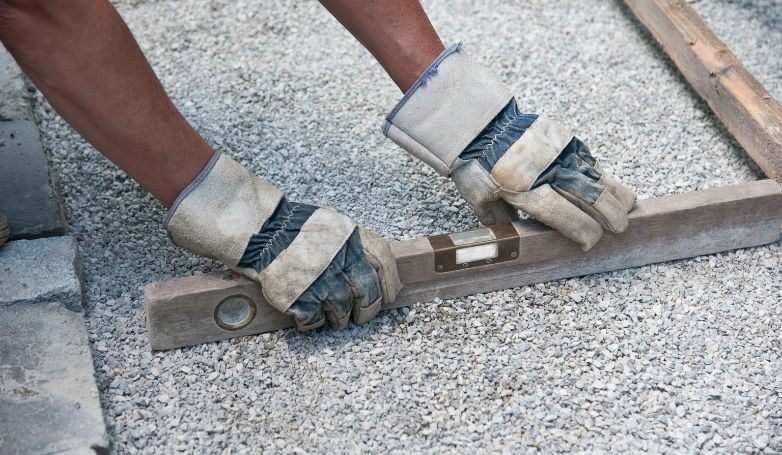
After clearing everything up, you have to make sure that the ground is as level as possible. A flat base is key for stability and water control.
It should be graded with tools to ensure runoff away from your house (at 1% – 2% slope). If there isn’t enough of an angle, water could pool up on your driveway over time and shorten its life span.
When making everything level, take note of how thick you’re making each layer of crushed asphalt because this step has an effect on their final appearance.
3. Address drainage issues
A lot of people don’t realize just how important proper drainage is when installing a new driveway!
You need to check if there’s an efficient way for water to run off without pooling anywhere near your home or at any point beneath your future asphalt pavement.
Inadequate drainage systems could cause damage like erosion, cracks, or potholes further down the line which could cost thousands to repair.
4. Select the appropriate crushed asphalt material
Opt for high-quality, recycled crushed asphalt that is specifically designed for driveways.
The material should have a mix of sizes to ensure compactness and stability.
Discuss options with your supplier to find the best fit for your climate and soil type. The right material will provide a strong, durable surface that resists weathering and heavy use.
5. Spread and compact the crushed asphalt
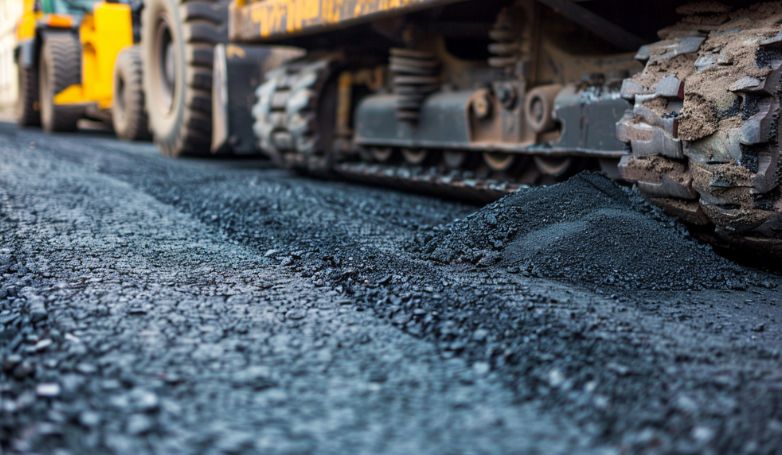
Spread the crushed asphalt across the prepared surface using a rake or mechanical spreader.
Aim for a uniform depth that will avoid any weak spots in the driveway but still get compacted enough to be strong, even and smooth, which can wear through thin areas of your driveway due to weathering and vehicle traffic.
6. Creates a smooth and even surface
After compaction, inspect the surface for any irregularities or low spots.
Fill anything you find with more crushed asphalt and compact it again if necessary.
Fixing these problems is not just about aesthetics. Making sure your driveway is flat will make it last longer and have consistent drainage, reducing maintenance issues down the line.
In turn, this will bring you a professional looking driveway that performs well when conditions vary.
6. Inspect and maintain your driveway regularly
Keep an eye on your driveway at all times, paying special attention to cracks, holes or loose areas.
Catching them early prevents major problems from happening in the future so you don’t have to pay out huge amounts of money for repairs.
Sealing your driveway every few years should also help protect against water infiltration, UV damage and chemical spills that are common with driveways like these.
Take care of it right now, so you don’t have to spend nearly as much later on trying to fix it up again.
Benefits of crushed asphalt driveway
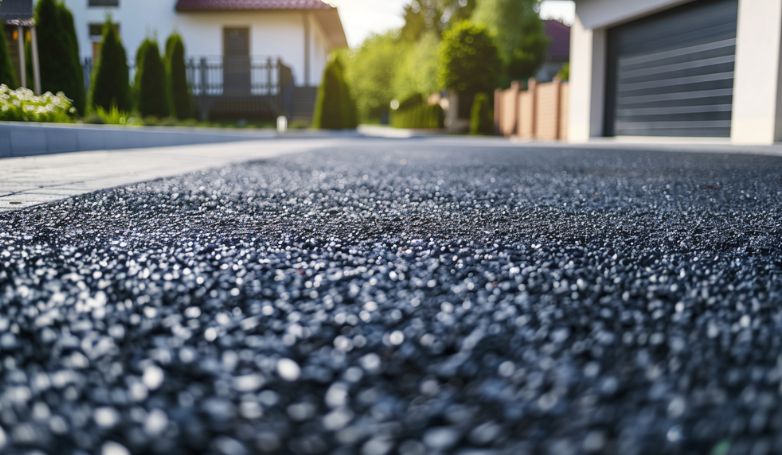
The advantages in choosing a crushed asphalt driveway are durability, cost-efficiency and environmental sustainability. Let’s get into the specifics of it all.
Cost-effectiveness compared to traditional asphalt or concrete
Most often crushed asphalt is less expensive than new asphalt or concrete because it uses recycled materials.
Homeowners can save a lot of money on the initial installation without compromising the driveway’s functionality or appearance.
This makes crushed asphalt an attractive option for those looking to maximize their budget while achieving a durable and appealing driveway solution.
Durability and longevity
Crushed asphalt driveways are incredibly durable and long-lasting. Once compacted, this material creates a hard surface that can withstand daily use like heavy vehicle traffic.
The resilience of crushed asphalt also means it can better resist the elements such as the scorching sun to freezing temperatures without cracking or eroding as quickly as other materials might.
With proper installation and minimal maintenance, a crushed asphalt driveway can serve your home for many years, making it a smart investment for the long term.
Low maintenance requirements
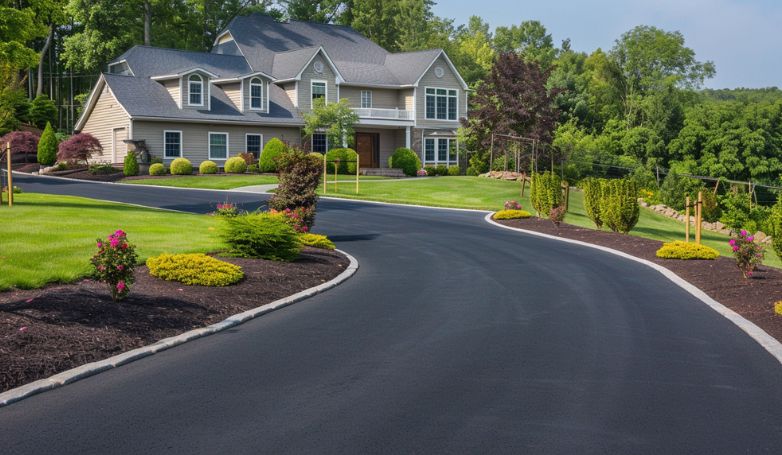
The demands of maintaining a crushed asphalt driveway are much lower than those of traditional paving materials.
Unlike concrete that could crack and require regular sealing, or gravel that needs frequent leveling, crushed asphalt maintains its integrity without constant upkeep from you.
All you’ll need is an occasional sweep to remove debris and check on signs of wear every so often. This ease of maintenance saves time but most importantly reduces long-term upkeep costs over time.
Eco-friendliness and sustainability
Making the decision to have a crushed asphalt driveway done is more than just an aesthetic choice.
The material is made from recycled pavement which helps you do your part to keep our environment healthy and thriving.
By choosing this option, you’re contributing to reducing land waste and the energy it takes to produce new pavement. In addition, crushed asphalt has excellent water drainage which will be useful in protected local waterways.
This might seem like a simple blacktop solution, but it’s much more than that!
Types of crushed asphalt materials available
The different types of crushed asphalt materials come in many shapes and sizes — all suited to various applications.
By understanding the options, homeowners can select the right one for their crushed asphalt driveway project:
Recycled Asphalt Pavement (RAP)
Recycled Asphalt Pavement (RAP) is the most commonly used type of crushed asphalt material.
To create RAP, workers grind up old roads, driveways, and parking lots to remove the original pavement. Reusing some of the original bitumen helps it compact and bind together once laid down and compacted again.
This material is a great option for those on a budget or with sustainability goals in mind since it utilizes existing supplies.
Asphalt Millings
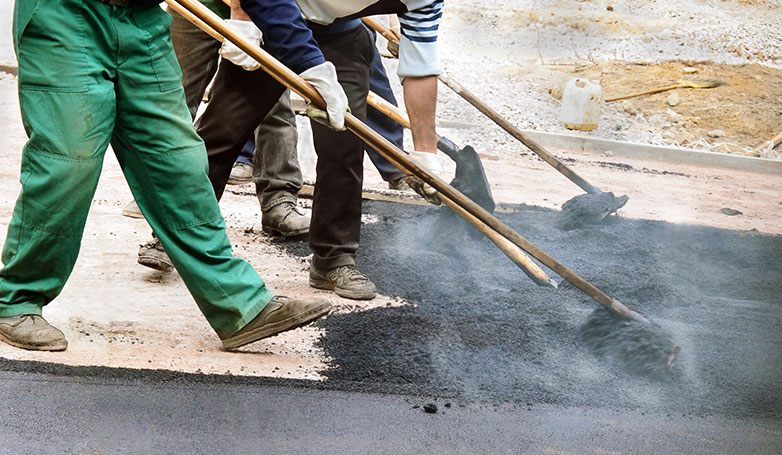
Workers produce asphalt millings by removing an asphalt surface with a milling machine.
The tiny particles are compact and do well at sticking together, making them excellent for creating solid surfaces that withstand time and wear.
Millings also have another unique property: over time in direct sun heat they rebind themselves into a semi-solid surface, which makes them easier to manage as they get older.
They can handle any weather condition or heavy use without much maintenance.
Hot Mix Asphalt (HMA)
While not exclusively made from just crushed asphalt, Hot Mix Asphalt (HMA) does contain a good amount of recycled content.
HMA combines new asphalt binder, fresh aggregate, and RAP before heating it all together to make it pliable enough to work with on-site construction equipment .
People who want traditional-looking driveways might choose this option because HMA makes smooth surfaces that look uniform but still has recycled content inside.
Cold Patch Asphalt
If you’re looking to repair your existing driveway rather than replace it entirely then cold patch asphalt may be what you need.
Cold patch asphalt comes in pre-mixed packages so you don’t have to worry about making it yourself. It’s ready for you to pour into those annoying potholes and divots or seal troublesome cracks.
While it may not be used to pave entire driveways, this material is beneficial for maintenance purposes — ensuring the driveway lasts longer.
Picking out the right kind of asphalt is a puzzle.
It all depends on so many different factors. You’ve got to think about the project’s very specific requirements and how you want it to look in the end. Budget matters too of course.
Homeowners need to work with professionals in order to get the best bang for their buck, that way they can make sure everything goes as smoothly as possible and they’ll be happy with what they get at the end of it all!
Crushed asphalt vs. gravel driveway
When it comes to deciding between crushed asphalt and gravel for your driveway, there are many factors at play.
You’ll want to consider things like cost, durability, maintenance required, and the overall look and feel of each material.
To help you better understand which one might be the right fit for your home (based on what you’re looking for), I’ve put together a handy table below:
| Factor | Crushed Asphalt | Gravel |
| Cost | Affordable, with potential long-term savings. | Generally lower upfront cost. |
| Durability | More durable, can withstand heavier loads. | Durable but may shift and spread. |
| Maintenance | Low maintenance; develops a semi-solid surface over time. | Requires frequent leveling and replenishment. |
| Ease of Installation | Requires spreading and compacting. | Simple to spread, but needs ongoing adjustment. |
| Aesthetics | Mimics traditional asphalt for a cohesive look. | Offers natural aesthetics with a variety of colors. |
| Eco-Friendliness | Made from recycled materials. | Permeable, better for groundwater recharge. |
Here, you’ll find the most important points about each option lined up side by side. Hopefully this makes things easier!
FAQs about crushed asphalt driveway
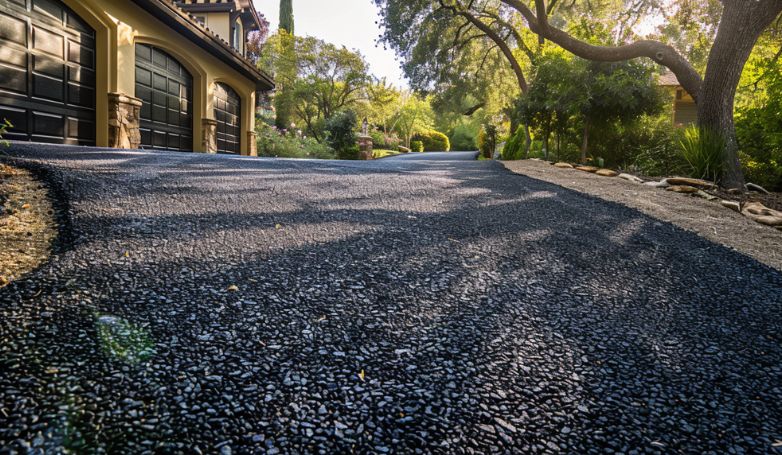
Here are detailed answers to frequently asked questions about crushed asphalt driveways to clear up some of the most burning concerns homeowners have:
Is crushed asphalt better than gravel?
The battle between crushed asphalt and gravel comes down to what you prioritize in a driveway. Crushed asphalt presents itself cohesively, requires less maintenance, and can turn semi-solid for more durability under vehicle traffic. While gravel is cheaper during purchase and carries a natural look. Both alternatives have environmental benefits; however, the lower maintenance that crushed asphalt demands may make it a better option for those who value durability and a clean appearance.
Is crushed asphalt any good?
Crushed asphalt makes an excellent choice for driveways. It’s cost-effective, durable, eco-friendly, and requires less maintenance compared to gravel. The process involves recycling old asphalt which reduces waste and decreases demand for new raw materials. Once compacted, it offers a solid surface that is able to withstand vehicle traffic — providing both practicality and aesthetics all in one paving solution.
How thick should a crushed asphalt driveway be?
The recommended thickness for a crushed asphalt driveway usually falls between 2-4 inches. Starting with a 2-inch base layer of larger crushed stone followed by another 2-inch layer of crushed asphalt allows proper compaction and stability. Making adjustments to the thickness based on load expectation as well as usage will further enhance its durability.
Does crushed asphalt get hard?
Indeed — with time — properly compacted crushed asphalt does get hard. This happens especially when exposed to heat after compaction has occurred. Heating activates binders within the material causing it to set and harden: creating a stable surface that mimics traditional pavement offering more durability.
Does crushed asphalt get muddy?
Water accumulation on top of a driveway occurs less often on crushed-asphalt surfaces compared to dirt or graveled driveways thanks to their compaction properties — but they are not immune to it. During heavy rain or in areas with poor drainage, water can pool on the surface and cause soft spots. Proper installation that focuses on drainage will minimize this issue, preserving the driveway’s integrity even during wet conditions.
Conclusion
Crushed asphalt driveways are the total package, offering something for all homeowners. It’s durable, cost-efficient and environmentally sustainable, making it a prime pick for many.
By knowing how to install it, what the benefits are and how to upkeep it, you can decide if this is best for you or not.
If not crushed asphalt, there’s always gravel to consider. But if going eco-friendly with low-maintenance qualities is your end goal, then embrace crushed asphalt as your best choice.

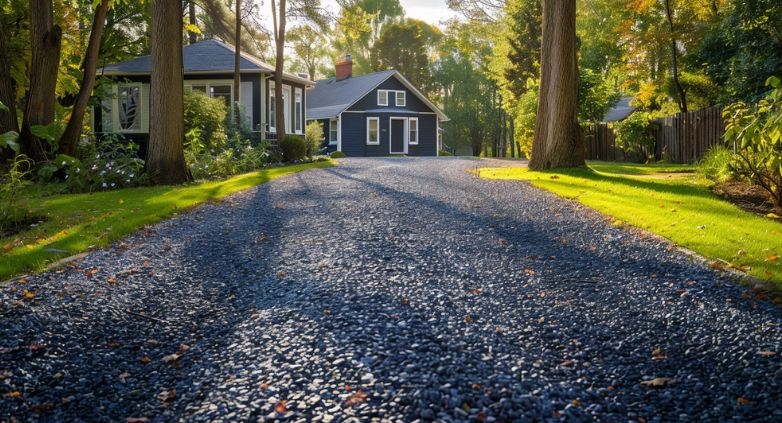

Leave a Reply
Want to join the discussion?Feel free to contribute!